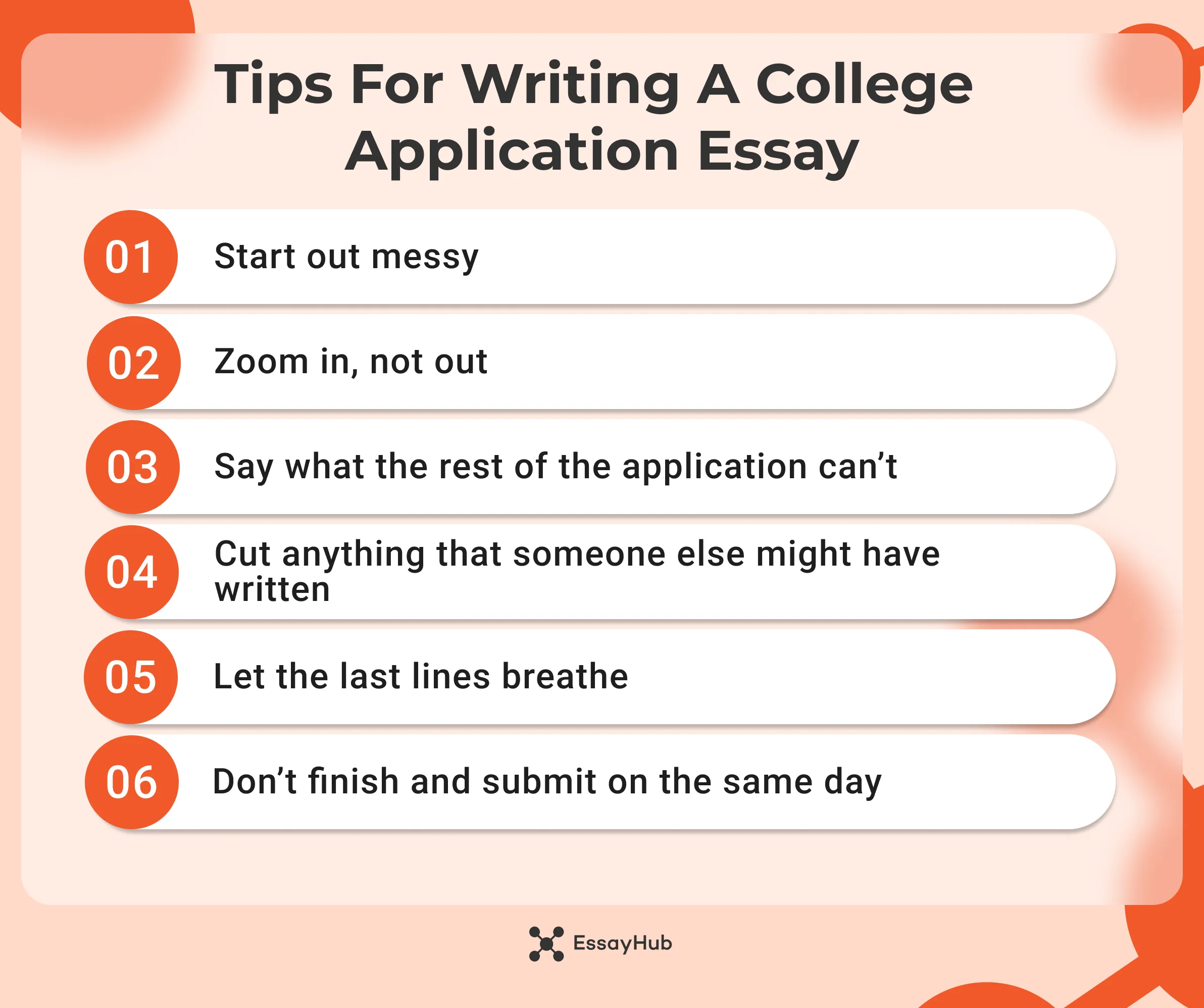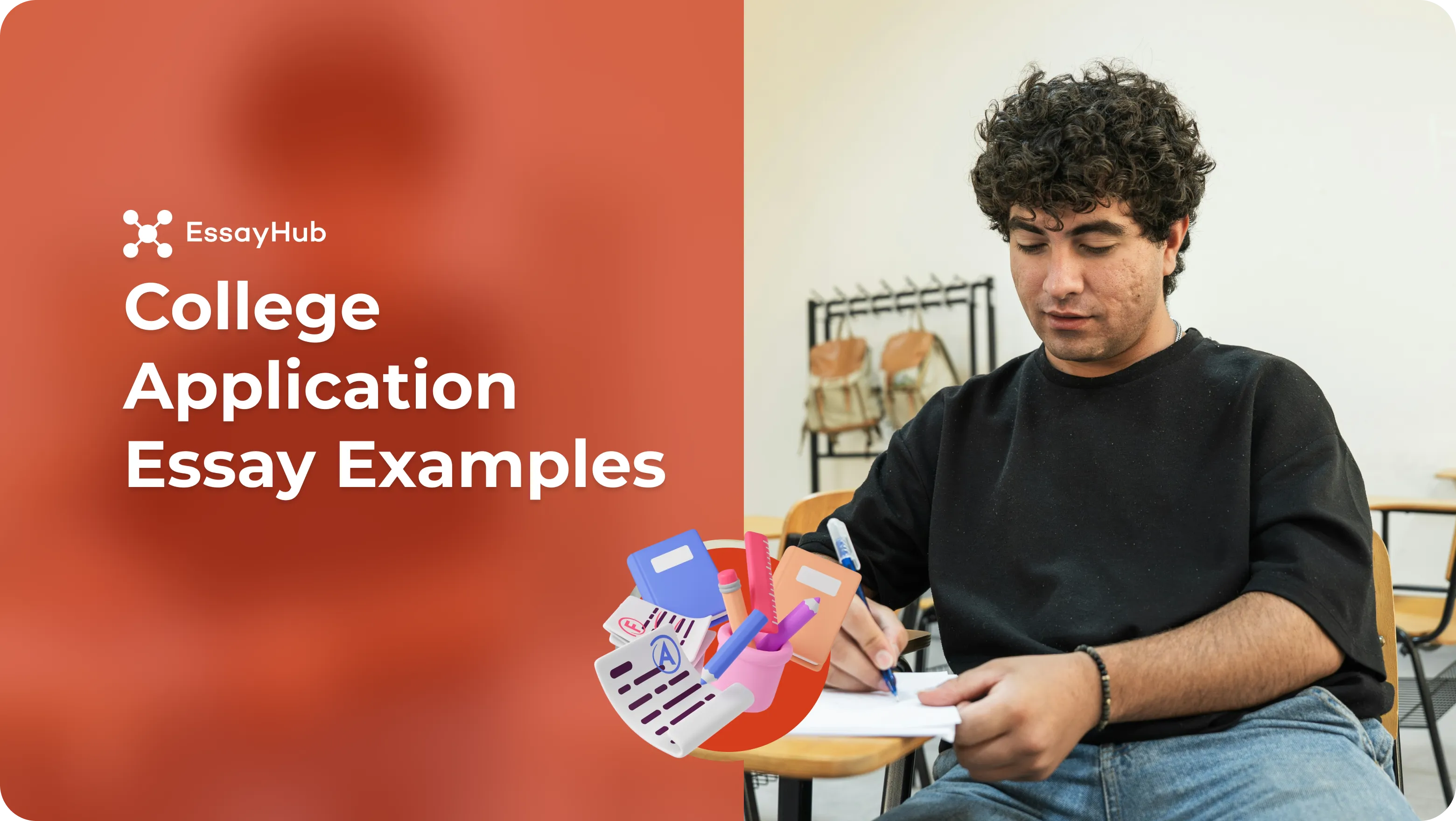A college essay is a statement submitted by a potential student along with their application. Such essays allow students to show the admissions board who they are as a person, beyond their grades and achievements. One of the best ways to write a successful essay for your application is by learning from real college essay examples that worked. Here’s a compiled list of a few samples that cover different topics so you know what solid writing should look like.
If you’re still confused about writing college application essays after reading this article, you can count on EssayHub to help. Whether you’re stuck on your outline or thinking, “I wish someone could write my essay just the way I need it,” our platform is designed to give students the exact academic guidance they need.
What Makes a Great College Application Essay?
What makes a college application essay work is the feeling that there’s a real person talking beyond the words. And no, this doesn’t necessarily mean you need to have a dramatic life or a perfect writing style. Quite the opposite: the strongest essays feel personal without trying too hard. Here’s what usually makes a great college essay:
- You can hear the person in the writing: It sounds like someone telling you a story they care about.
- It’s built on a single idea: A good essay picks one point and follows it through.
- Details feel lived-in, not staged: Specific names, actions, or even a single sentence of dialogue can pull the reader in.
- The reflection feels honest: It doesn’t need to wrap up neatly, but it should show what the experience meant to you.
- It reads smoothly without trying to impress: You can tell when the writer is just telling the story as it happened.
Tips for Writing College Application Essays
Before we move on to real college application essay examples, let’s go through a few practical tips that will help you find your voice:

- Start messy: Don’t try to write the perfect opening line right away. Just write what’s in your head, even if it’s all over the place. Real insight comes out when you’re not trying too hard.
- Zoom in, not out: Instead of writing about a big topic like “my love of science,” focus on one very specific moment.
- Say what the rest of the application can’t: Your transcript already shows your grades. Your activities list shows what you’ve done. Use your essay to show what you care about.
- Cut anything someone else might have written: Your essay should feel like it only makes sense coming from you, not a motivational poster.
- Let the last lines breathe: If the essay ends in an honest place, even if it’s a little open-ended, that can be more powerful than a perfect final statement.
- Don’t finish and submit on the same day: Once you’ve written a draft you kind of like, give it a few days and come back to it only after. You’ll hear more of what feels off.
College Application Essay Examples
Now that you have a general idea of how to write an essay for college application that makes the admissions committee pay attention, we can move on to real samples so you can see everything in action. A professional admission essay writing service can support you in shaping your essay to impress the admissions team.
Example 1: Loud Music, Quiet House: Learning to Speak Where It Matters
Our house was always quiet. Not the kind of quiet that feels peaceful, but more like a hush that filled every room, as if the walls were holding their breath. Doors closed softly. Conversations stayed short. Most evenings, I would sit in the kitchen listening to the sound of my dad’s fork tapping his plate, counting the seconds between bites.
In middle school, I found headphones. Music filled the silence without asking permission. I started with the classics - Queen, Bowie, the Stones - anything my parents might recognize, hoping they'd say something. They never did. The louder the music got, the more invisible I felt. I played guitar in my bedroom, not to impress anyone, but because the chords gave me something to hold on to. Noise became a kind of comfort, even when no one responded.
During my freshman year, I joined the school jazz band. Practice started early, before the building even felt awake. That room became my place. It smelled like brass polish and coffee. The drummer cracked jokes that never landed. The bass player hummed between solos. Our director, Ms. Lee, always wore sneakers that squeaked when she conducted. It was the first time I noticed how sound created a sense of belonging.
At home, things stayed quiet. My parents weren’t unkind. They just didn’t say much. My mom worked double shifts at the hospital. My dad, once a mechanic, now did warehouse inventory. Both were tired. Dinners often ended with “I’m going to bed.” I started filling notebooks with lyrics I never shared. The pages stacked up in my closet.
One afternoon, Ms. Lee pulled me aside after rehearsal. “You play like you’ve got something to say,” she said. I laughed because I didn’t know how to respond. She wasn’t wrong, though. The way I bent notes or held a rest longer than written… I was trying to communicate something I didn’t know how to explain.
The next week, she handed me a solo. “It’s yours,” she said. The piece was slow, moody, full of space. No flashy runs. Just a melody that required intention. I practiced every night, headphones off, doors open. My dad passed my room once, paused, then kept walking.
At our winter concert, the room was packed. Folding chairs squeaked as people shifted in their seats. When my solo came, the world narrowed to the shape of my saxophone. I didn’t think about notes. I thought about the pause in conversation after dinner. I thought about the quiet that lingered even when people were in the same room. I played like I was speaking into that quiet.
Afterward, backstage, my mom hugged me without saying anything. My dad patted my shoulder and said, “Sounded good.” That was enough.
Since then, I’ve looked for places where people listen. I joined peer mentoring at school. Sometimes I sit with students who say nothing at all. I’ve learned that silence can be its own kind of language. It’s not always emptiness. Sometimes it’s waiting.
When I write music now, I leave space for rests. I think about the notes I choose and why I choose them. Communication isn’t always loud. It doesn’t always need volume. But it does need presence. That’s what I try to bring, whether I’m in a practice room, at the lunch table, or helping a classmate through a hard day.
College, for me, isn’t just an academic step. It’s a chance to keep learning how to be heard and how to listen better. I want to study music theory because I’m fascinated by structure. I want to take classes in communication because I’ve seen how much tone, timing, and body language matter. I also want to volunteer somewhere that reminds me of home—quiet spaces where people might not speak up unless someone makes room.
I’m not trying to fill silence anymore. I’m learning how to be part of it. Music gave me a voice when I didn’t know I had one. Now I want to keep using it where it matters.
Analysis: This essay works because it feels real. The writer tells a story that feels honest and specific. Details like the fork tapping or the smell of the band room pull you in. There’s a clear sense of growth, but it’s never overstated. The ending lands well, though it could be a little stronger with more about what the student hopes to do next. A line or two with clearer stakes, why this moment matters for the student’s future, might have made the essay sharper. A bit more specificity around goals or programs could also tie the reflection more directly to the college application context.
Check also: Why Major Essay Examples.
Example 2: One Sock, Two Left Feet, and a Debate Tournament
The pan was too hot. I knew it the second the egg mixture hit the surface and sizzled loud enough to wake my sister. I grabbed the spatula anyway and tried to save it, scraping the edges into a shape that vaguely resembled breakfast. The smoke alarm chirped once, but I waved it off with a towel. The omelet was uneven, too dark on one side, and stuck stubbornly in the middle. Still, I slid it onto the plate and set it down in front of my dad without saying a word.
He didn’t flinch. Just poured coffee into a chipped mug, nodded, and started eating. Every Sunday morning that year began with the same scene: me burning an omelet and him pretending it tasted fine. We never talked much during those meals. But that routine held something together I didn’t know I needed.
Junior year was loud in every way except at home. School felt like an endless blur of deadlines, tests, and group projects where I always ended up doing the writing. My friends thought I was organized. I didn’t correct them. The truth sat in a stack of notebooks under my bed, full of half-finished thoughts and highlighted reminders that I never quite followed.
At the start of the school year, my mom moved out. It wasn’t sudden. The signs were there: post-it notes instead of conversations, bags that stayed packed, long drives for milk that ended in hours of silence. One morning she left and didn’t come back. The door clicked shut with more finality than I expected.
I didn’t cry. I just started waking up earlier. The kitchen became my place to focus. Cracking eggs, flipping toast, washing the same pan every morning… it all gave me something I could control, even when nothing else made much sense.
My dad adjusted in quiet ways. He left the mail in a neat pile next to my cereal bowl. He started wearing mismatched socks less often. We didn’t talk about what happened. We didn’t talk much at all. But he sat down every Sunday morning and ate my overcooked omelets like they were exactly what he wanted.
One weekend in December, I finally got it right. The edges curled just enough, and the center stayed fluffy. I added cheese, folded it cleanly, and even garnished the plate with two slices of apple. He took one bite and said, “This one’s good.” I laughed harder than I had in weeks. The next Sunday, I burnt it again.
Somehow, those mornings helped me keep going. They gave shape to weeks that felt formless. I started bringing that rhythm into other parts of my life. I kept a better calendar. I stopped trying to write everything in one sitting and learned to give myself real breaks. I talked less in group projects and listened more. When a classmate lost her notes before finals, I spent an afternoon helping her rebuild them. I didn’t need to be the expert. I just needed to show up.
Cooking never became a talent. I still forget to set timers. I still flip pancakes too early. But making breakfast taught me how to move through hard days with something steady in hand. That’s what I’ll carry forward.
In college, I want to keep building those kinds of habits, ones that make room for people, ones that hold structure when things shift. I’m interested in psychology because I want to understand how routines affect mood and memory. I’ve seen how simple acts, like a shared meal, can offer more than comfort. They can create space for healing without saying much at all.
Now, my dad sometimes makes breakfast on Sundays. He doesn’t burn the eggs, but he always pours too much coffee. We still don’t say a lot while we eat, but the silence feels different. It feels chosen.
Junior year didn’t fall apart all at once. It frayed in pieces. But every week, that burnt omelet reminded me I could still show up for someone. I could still create something, even if it wasn’t perfect. That mattered more than I knew at the time. It still does.
Analysis: This essay is grounded in small, memorable details: the mismatched socks, the two left shoes, the tapping judge’s pen. Those images feel real and draw the reader in right away. The writing doesn’t try too hard to impress. There’s a quiet persistence that feels genuine. One small improvement could be adding a bit more about what the student hopes to pursue in college, just to round out the ending. Still, the pacing and self-awareness make this essay both relatable and strong.
Example 3: How a Burnt Omelet Got Me Through Junior Year
The pan was too hot. I knew it the second the egg mixture hit the surface and sizzled loud enough to wake my sister. I grabbed the spatula anyway and tried to save it, scraping the edges into a shape that vaguely resembled breakfast. The smoke alarm chirped once, but I waved it off with a towel. The omelet was uneven, too dark on one side, and stuck stubbornly in the middle. Still, I slid it onto the plate and set it down in front of my dad without saying a word.
He didn’t flinch. Just poured coffee into a chipped mug, nodded, and started eating. Every Sunday morning that year began with the same scene: me burning an omelet and him pretending it tasted fine. We never talked much during those meals. But that routine held something together I didn’t know I needed.
Junior year was loud in every way except at home. School felt like an endless blur of deadlines, tests, and group projects where I always ended up doing the writing. My friends thought I was organized. I didn’t correct them. The truth sat in a stack of notebooks under my bed, full of half-finished thoughts and highlighted reminders that I never quite followed.
At the start of the school year, my mom moved out. It wasn’t sudden. The signs were there: post-it notes instead of conversations, bags that stayed packed, long drives for milk that ended in hours of silence. One morning she left and didn’t come back. The door clicked shut with more finality than I expected.
I didn’t cry. I just started waking up earlier. The kitchen became my place to focus. Cracking eggs, flipping toast, washing the same pan every morning… it all gave me something I could control, even when nothing else made much sense.
My dad adjusted in quiet ways. He left the mail in a neat pile next to my cereal bowl. He started wearing mismatched socks less often. We didn’t talk about what happened. We didn’t talk much at all. But he sat down every Sunday morning and ate my overcooked omelets like they were exactly what he wanted.
One weekend in December, I finally got it right. The edges curled just enough, and the center stayed fluffy. I added cheese, folded it cleanly, and even garnished the plate with two slices of apple. He took one bite and said, “This one’s good.” I laughed harder than I had in weeks. The next Sunday, I burnt it again.
Somehow, those mornings helped me keep going. They gave shape to weeks that felt formless. I started bringing that rhythm into other parts of my life. I kept a better calendar. I stopped trying to write everything in one sitting and learned to give myself real breaks. I talked less in group projects and listened more. When a classmate lost her notes before finals, I spent an afternoon helping her rebuild them. I didn’t need to be the expert. I just needed to show up.
Cooking never became a talent. I still forget to set timers. I still flip pancakes too early. But making breakfast taught me how to move through hard days with something steady in hand. That’s what I’ll carry forward.
In college, I want to keep building those kinds of habits, ones that make room for people, ones that hold structure when things shift. I’m interested in psychology because I want to understand how routines affect mood and memory. I’ve seen how simple acts, like a shared meal, can offer more than comfort. They can create space for healing without saying much at all.
Now, my dad sometimes makes breakfast on Sundays. He doesn’t burn the eggs, but he always pours too much coffee. We still don’t say a lot while we eat, but the silence feels different. It feels chosen.
Junior year didn’t fall apart all at once. It frayed in pieces. But every week, that burnt omelet reminded me I could still show up for someone. I could still create something, even if it wasn’t perfect. That mattered more than I knew at the time. It still does.
Analysis: This essay draws the reader in with specific moments that feel lived-in and honest. The burnt omelet becomes a symbol of care. The imagery is strong, and the emotional thread is subtle but powerful. One thing that could be stronger is the closing. The last lines could carry more weight with a sharper sense of direction: for example, what the writer hopes to bring into new environments beyond just habits. A bit more forward-looking energy would leave a stronger final impression.
Example 4: My Grandmother’s Garden Had No Wi-Fi but Taught Me Everything
The soil under my nails always smelled faintly of tomatoes and basil. By the time I was seven, I could tell when cucumbers were ready just by the feel of their skin. My grandmother never used a timer, never followed a calendar, and yet everything in her garden grew as if it had memorized her rhythm. Every summer, I stayed with her in a small brick house with faded blue shutters, surrounded by rows of vegetables and flowers taller than I was.
No internet ever reached that yard. The signal stopped at the cracked stone steps near the back door. I didn’t mind. I sat in the dirt, sorting seeds while bees moved lazily between the lavender and the sunflowers. Cicadas hummed like background music. The hose made a snake across the lawn, always dripping somewhere. My job was simple: water the young plants before the sun got too high.
At first, I thought she just liked the quiet. But as I got older, I realized she was teaching me to notice things. A drooping stem meant too much sun. Leaves curled at the tips asked for a break from the hose. “Plants don’t scream,” she once told me, “but they speak just fine.” I learned to watch closely. Not just in the garden, but everywhere.
That habit followed me into middle school. While others talked fast and loud, I listened. I picked up on small shifts:m when a friend’s laugh didn’t reach her eyes, when a teacher paused too long after a question. Those small cues shaped how I showed up. I started tutoring classmates who didn’t always ask for help. I sat next to the new kid in homeroom because no one else had. Not because I felt sorry for anyone. I just noticed.
Freshman year, my grandmother passed away in early spring. The garden that year came back without her. My aunt tried to keep it going, but the rhythm felt different. I still visited. I still sat on the stone steps and watered the tomatoes. The hose still leaked. But the silence hit harder.
That summer, I started volunteering at a community garden near our apartment. The space was tucked behind a row of buildings, full of raised beds and uneven walkways. I helped an older man named Roy untangle the irrigation system. He wore thick gloves and called me “kiddo.” On Saturdays, we packed fresh produce into paper bags for families who stopped by after work.
One morning, a little boy came with his mom. He clutched a half-rotten apple and kept tugging her sleeve. She looked tired. I handed him a bag of carrots and a smile. He didn’t say anything, just reached out and held my wrist for a second before running back to the sidewalk. That moment stayed with me.
I kept showing up. Pulling weeds. Sorting peppers. Fixing broken signs. Each task reminded me of the quiet work my grandmother did every day, things that didn’t ask for attention but still made something better. At school, I started a lunch garden project behind the science wing. We planted herbs, greens, and a few stubborn strawberries. It didn’t grow perfectly. But it grew.
College, to me, feels like a larger garden I’m just beginning to step into. I want to study environmental science because I’ve seen how soil holds more than roots. It holds stories, habits, and change. I’m drawn to systems, to understanding how small shifts lead to larger ones. I’m also interested in community work, especially in places where food access is uneven. That connection between land and people feels personal.
My grandmother never talked about education. She barely finished high school. But every lesson she passed on was about patience, attention, and care. Her garden didn’t need Wi-Fi. It needed presence. That’s what I carry with me.
When I visit her old yard now, the lavender still grows wild near the fence. I run my hand across the stems and listen. Not for words, but for the pause that tells me something’s still living here. Something worth tending.
Analysis: This essay stands out because of its grounded voice and rich imagery. The garden becomes a clear metaphor without ever feeling forced. Moments like the leaky hose and the little boy with the apple feel real and lived-in. The student’s values - observation, care, community - come through naturally. The connection to college goals is also thoughtful and well-placed. One area for improvement could be the conclusion. While reflective and poetic, it leans slightly abstract. A closing sentence with a bit more direction could give the essay a stronger finish.
Example 5: What I Found in the School Lost-and-Found Bin
The bin sat under the front office counter, a plastic tub scuffed along the edges and always slightly dusty. It smelled faintly like gym clothes and cafeteria tater tots. Nobody paid much attention to it, just a container for forgotten things. Hoodies with missing drawstrings. Water bottles with faded names. A single shoe. Once, I saw a retainer still in its case, left behind like a secret.
I started organizing the lost-and-found in sixth grade, mostly because I had nowhere to sit during lunch. The tables always filled quickly, and I never moved fast enough. I wandered the hall instead, sometimes stopping by the front desk. Mrs. Fallon, the secretary, let me stay quiet while she typed attendance records. One day, she slid the bin toward me and said, “If you’re bored, you could try sorting this.”
I found a notebook that day. Spiral-bound, green cover, corners bent like dog ears. Inside were a few sketches and a list titled “Things I’m Afraid Of.” Heights. Clowns. The dark. Being boring. The handwriting looked like mine but loopier, more open. I didn’t recognize the name scribbled inside the cover. I read every page. Then I closed it and placed it in the “still missing” pile.
Week by week, I kept sorting. I matched gloves by pattern. I lined up lunchboxes by color and guessed whose they might be based on sticker choices. A cracked iPhone case led me to Brandon in homeroom. He’d been quiet all week and smiled once I handed it over. “Didn’t think I’d see this again,” he said. I didn’t say much. Just nodded.
At home, I started doing the same thing. I organized the hall closet by jacket type. I labeled cords with masking tape. My dad joked that I’d become the “house detective.” In truth, I just liked finding where things belonged. There was something satisfying about watching a space go from messy to clear.
In eighth grade, I helped a student find a missing bracelet. Her brother had given it to her before he deployed. She hadn’t told anyone it was gone. I found it wedged behind a basket of lunchboxes. She didn’t thank me right away. She just stared at it, then at me, then whispered, “Thanks.” That moment stayed with me longer than any quiz score.
By sophomore year, I was volunteering in the main office during study hall. The bin had changed - new container, bigger space - but the forgotten items still piled high. Sometimes I’d see things disappear and reappear. A sweatshirt vanished on Monday, came back on Thursday, this time smelling like cologne. I never asked questions. I just kept sorting.
People began noticing. Teachers sent students my way when something went missing. I developed a system with tags and shelves. Eventually, I created a digital log using an old Chromebook no one was using. My spreadsheet tracked colors, brands, notes scribbled on labels. It wasn’t fancy, but it worked.
It also helped me feel useful in ways I hadn’t before. I wasn’t the loudest in class or the best at raising my hand. But I could listen. I could observe. I could piece together quiet clues that most people missed. And sometimes, that was enough to make someone feel seen.
College, for me, feels like another kind of lost-and-found. People arrive carrying pieces of themselves they haven’t named yet: fears, talents, questions, half-formed goals. I want to be part of that space. I want to study sociology and information science because I’m interested in systems - how people move through them, how they lose parts of themselves inside them, and how they find meaning again.
The bin still sits in the front office, now a little more organized, labeled by week and season. I stop by sometimes, even when I don’t need to. Last week, I found a jacket I’d lost in ninth grade. I picked it up, felt the weight of it, then put it back. Someone else might need it now.
That’s what I learned in that space: most things aren’t gone forever. They’re just waiting for the right moment (and person) to find them again.
Analysis: This essay uses the lost-and-found bin as a clever metaphor which reveals the writer’s personality: observant, thoughtful, and steady. The small moments like the bracelet story or the notebook with fears scribbled inside feel genuine. The connection to future academic interests is clear and grounded in lived experience. To make it even stronger, the final paragraph could benefit from a more direct reflection on how these quiet skills will shape the student’s college life beyond academics. A slightly more personal ending would give the essay just a bit more impact.
- Essays That Worked. (n.d.). Johns Hopkins University Admissions. https://apply.jhu.edu/college-planning-guide/essays-that-worked/
- Hamilton College. (2021). Hamilton College. https://www.hamilton.edu/admission/apply/college-essays-that-worked






